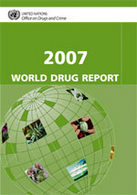2007年VOA标准英语-UN Report: Global Drug Abuse Under Control
搜索关注在线英语听力室公众号:tingroom,领取免费英语资料大礼包。
(单词翻译)
By Lisa SchleinGeneva
25 June 2007
The United Nations says there is growing evidence that the worldwide epidemic1 of drug abuse is being brought under control. In this year's World Drug Report, the United Nations notes there have been significant and positive changes in world drugs markets and that run-away addiction2 has slowed. Lisa Schlein reports for VOA from Geneva where the report was released.
 |
| UN's 2007 World Drug Report |
It says coca cultivation in the Andean countries continues to fall, driven by significant declines in Colombia. It says the global demand for cocaine also has stabilized. But, it notes the decline in the United States is offset8 by alarming increases in some European countries.
The report says the production and consumption of amphetamines has leveled off and for the first time in years, the global production and consumption of cannabis has not gone up.
While all this is good news, the United Nations is quick to say that huge problems with illicit drug abuse remain. It warns against complacency and says the situation could easily deteriorate9 again.
The United Nations finds opium10 cultivation has declined in Myanmar, Laos and the rest of the world. But, it says it increased dramatically in Afghanistan in 2006. The main author of the Report, Thomas Pietschmann, says the southern province of Helmand, which is largely under the control of the Taleban, is on the verge11 of becoming the world's biggest drug supplier.
"We see a very, very close link between drug production and insurgency12 and security or lack of security," said Thomas Pietschmann. "But, it is also clear that the original strategy of the allied13 forces to ignore the opium poppy was not particularly successful because it created all the financial revenues for the insurgency to operate and become even more powerful."
The Report puts the value of the illicit drugs market at $322 billion a year.
It says Africa is being targeted by traffickers seeking new routes, including cocaine traffickers from Colombia and heroin smugglers from Afghanistan. Pietschmann says there is a spillover effect from the increased trafficking and this is leading to growing drug consumption in Africa.
"People are getting paid in drugs," he said. "In order to make this into money they have to sell it. They do not have other possibilities, so they sell the drugs locally and the market is being created. And, thus we see also in Africa increasingly markets being created for heroin and for cocaine even though the levels if you compare it to America or to Europe are still very small."
Pietschmann calls this situation alarming. He says Africa is a poor continent and cannot deal with a plague of drug abuse and addiction.
The report says drug law enforcement has improved and large seizures14 of cocaine and heroin have helped contain the drug problem. At the same time, it notes there are 25 million problem drug users in the world. It says more attention must be paid to drug prevention and treatment.




